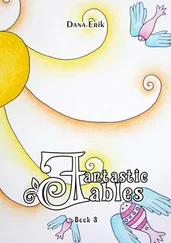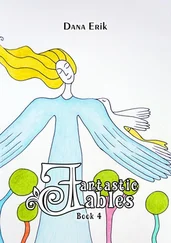Ambrose Bierce - Fantastic Fables
Здесь есть возможность читать онлайн «Ambrose Bierce - Fantastic Fables» весь текст электронной книги совершенно бесплатно (целиком полную версию без сокращений). В некоторых случаях можно слушать аудио, скачать через торрент в формате fb2 и присутствует краткое содержание. Жанр: Классическая проза, Юмористическая проза, на английском языке. Описание произведения, (предисловие) а так же отзывы посетителей доступны на портале библиотеки ЛибКат.
- Название:Fantastic Fables
- Автор:
- Жанр:
- Год:неизвестен
- ISBN:нет данных
- Рейтинг книги:5 / 5. Голосов: 1
-
Избранное:Добавить в избранное
- Отзывы:
-
Ваша оценка:
- 100
- 1
- 2
- 3
- 4
- 5
Fantastic Fables: краткое содержание, описание и аннотация
Предлагаем к чтению аннотацию, описание, краткое содержание или предисловие (зависит от того, что написал сам автор книги «Fantastic Fables»). Если вы не нашли необходимую информацию о книге — напишите в комментариях, мы постараемся отыскать её.
Fantastic Fables — читать онлайн бесплатно полную книгу (весь текст) целиком
Ниже представлен текст книги, разбитый по страницам. Система сохранения места последней прочитанной страницы, позволяет с удобством читать онлайн бесплатно книгу «Fantastic Fables», без необходимости каждый раз заново искать на чём Вы остановились. Поставьте закладку, и сможете в любой момент перейти на страницу, на которой закончили чтение.
Интервал:
Закладка:
Hearing a sound of strife, a Christian in the Orient asked his Dragoman the cause of it.
“The Buddhists are cutting Mohammedan throats,” the Dragoman replied, with oriental composure.
“I did not know,” remarked the Christian, with scientific interest, “that that would make so much noise.”
“The Mohammedans are cutting Buddhist throats, too,” added the Dragoman.
“It is astonishing,” mused the Christian, “how violent and how general are religious animosities. Everywhere in the world the devotees of each local faith abhor the devotees of every other, and abstain from murder only so long as they dare not commit it. And the strangest thing about it is that all religions are erroneous and mischievous excepting mine. Mine, thank God, is true and benign.”
So saying he visibly smugged and went off to telegraph for a brigade of cutthroats to protect Christian interests.
The Penitent Elector
A Person belonging to the Society for Passing Resolutions of Respect for the Memory of Deceased Members having died received the customary attention.
“Good Heavens!” exclaimed a Sovereign Elector, on hearing the resolutions read, “what a loss to the nation! And to think that I once voted against that angel for Inspector of Gate-latches in Public Squares!”
In remorse the Sovereign Elector deprived himself of political influence by learning to read.
The Tail of the Sphinx
A Dog of a taciturn disposition said to his Tail:
“Whenever I am angry, you rise and bristle; when I am pleased, you wag; when I am alarmed, you tuck yourself in out of danger. You are too mercurial—you disclose all my emotions. My notion is that tails are given to conceal thought. It is my dearest ambition to be as impassive as the Sphinx.”
“My friend, you must recognise the laws and limitations of your being,” replied the Tail, with flexions appropriate to the sentiments uttered, “and try to be great some other way. The Sphinx has one hundred and fifty qualifications for impassiveness which you lack.”
“What are they?” the Dog asked.
“One hundred and forty-nine tons of sand on her tail.”
“And—?”
“A stone tail.”
A Prophet of Evil
An Undertaker Who Was a Member of a Trust saw a Man Leaning on a Spade, and asked him why he was not at work.
“Because,” said the Man Leaning on a Spade, “I belong to the Gravediggers’ National Extortion Society, and we have decided to limit the production of graves and get more money for the reduced output. We have a corner in graves and propose to work it to the best advantage.”
“My friend,” said the Undertaker Who Was a Member of a Trust, “this is a most hateful and injurious scheme. If people cannot be assured of graves, I fear they will no longer die, and the best interests of civilisation will wither like a frosted leaf.”
And blowing his eyes upon his handkerchief, he walked away lamenting.
The Crew of the Life-boat
The Gallant Crew at a life-saving station were about to launch their life-boat for a spin along the coast when they discovered, but a little distance away, a capsized vessel with a dozen men clinging to her keel.
“We are fortunate,” said the Gallant Crew, “to have seen that in time. Our fate might have been the same as theirs.”
So they hauled the life-boat back into its house, and were spared to the service of their country.
A Treaty of Peace
Through massacres of each other’s citizens China and the United States had been four times plunged into devastating wars, when, in the year 1994, arose a Philosopher in Madagascar, who laid before the Governments of the two distracted countries the following modus vivendi :
“Massacres are to be sternly forbidden as heretofore; but any citizen or subject of either country disobeying the injunction is to detach the scalps of all persons massacred and deposit them with a local officer designated to receive and preserve them and sworn to keep and render a true account thereof. At the conclusion of each massacre in either country, or as soon thereafter as practicable, or at stated regular periods, as may be provided by treaty, there shall be an exchange of scalps between the two Governments, scalp for scalp, without regard to sex or age; the Government having the greatest number is to be taxed on the excess at the rate of $1000 a scalp, and the other Government credited with the amount. Once in every decade there shall be a general settlement, when the balance due shall be paid to the creditor nation in Mexican dollars.”
The plan was adopted, the necessary treaty made, with legislation to carry out its provisions; the Madagascarene Philosopher took his seat in the Temple of Immortality, and Peace spread her white wings over the two nations, to the unspeakable defiling of her plumage.
The Nightside of Character
A Gifted and Honourable Editor, who by practice of his profession had acquired wealth and distinction, applied to an Old Friend for the hand of his daughter in marriage.
“With all my heart, and God bless you!” said the Old Friend, grasping him by both hands. “It is a greater honour than I had dared to hope for.”
“I knew what your answer would be,” replied the Gifted and Honourable Editor. “And yet,” he added, with a sly smile, “I feel that I ought to give you as much knowledge of my character as I possess. In this scrap-book is such testimony relating to my shady side, as I have within the past ten years been able to cut from the columns of my competitors in the business of elevating humanity to a higher plane of mind and morals—my ‘loathsome contemporaries.’”
Laying the book on a table, he withdrew in high spirits to make arrangements for the wedding. Three days later he received the scrap-book from a messenger, with a note warning him never again to darken his Old Friend’s door.
“See!” the Gifted and Honourable Editor exclaimed, pointing to that injunction—“I am a painter and grainer!”
And he was led away to the Asylum for the Indiscreet.
The Faithful Cashier
The Cashier of a bank having defaulted was asked by the Directors what he had done with the money taken.
“I am greatly surprised by such a question,” said the Cashier; “it sounds as if you suspected me of selfishness. Gentlemen, I applied that money to the purpose for which I took it; I paid it as an initiation fee and one year’s dues in advance to the Treasurer of the Cashiers’ Mutual Defence Association.”
“What is the object of that organisation?” the Directors inquired.
“When any one of its members is under suspicion,” replied the Cashier, “the Association undertakes to clear his character by submitting evidence that he was never a prominent member of any church, nor foremost in Sunday-school work.”
Recognising the value to the bank of a spotless reputation for its officers, the President drew his check for the amount of the shortage and the Cashier was restored to favour.
The Circular Clew
A Detective searching for the murderer of a dead man was accosted by a Clew.
“Follow me,” said the Clew, “and there’s no knowing what you may discover.”
So the Detective followed the Clew a whole year through a thousand sinuosities, and at last found himself in the office of the Morgue.
“There!” said the Clew, pointing to the open register.
The Detective eagerly scanned the page, and found an official statement that the deceased was dead. Thereupon he hastened to Police Headquarters to report progress. The Clew, meanwhile, sauntered among the busy haunts of men, arm in arm with an Ingenious Theory.
Читать дальшеИнтервал:
Закладка:
Похожие книги на «Fantastic Fables»
Представляем Вашему вниманию похожие книги на «Fantastic Fables» списком для выбора. Мы отобрали схожую по названию и смыслу литературу в надежде предоставить читателям больше вариантов отыскать новые, интересные, ещё непрочитанные произведения.
Обсуждение, отзывы о книге «Fantastic Fables» и просто собственные мнения читателей. Оставьте ваши комментарии, напишите, что Вы думаете о произведении, его смысле или главных героях. Укажите что конкретно понравилось, а что нет, и почему Вы так считаете.






